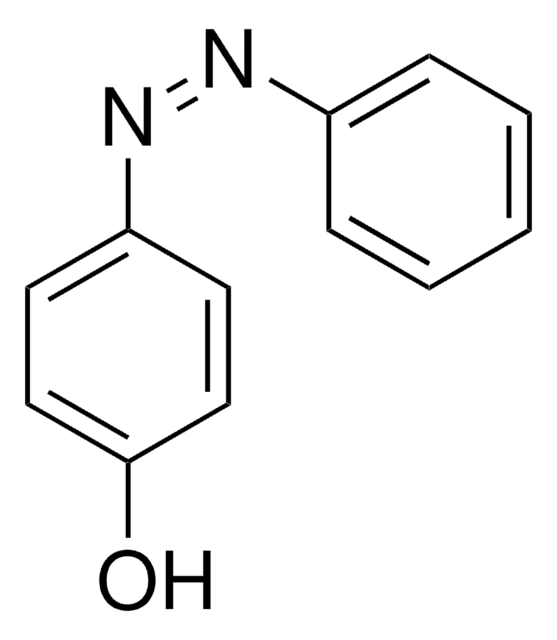103624
Sudan I
Dye content ≥95 %
Synonym(s):
1-Phenylazo-2-naphthol, Solvent Yellow 14
About This Item
Recommended Products
form
powder
Quality Level
composition
Dye content, ≥95%
color
orange to very dark orange
pH
10.2 (26 °C)
mp
131-133 °C (lit.)
solubility
chloroform: 1 mg/mL, clear to very slightly hazy, orange
density
0.32 g/cm3 at 20 °C ((68 °F) - OECD Test Guideline 109)
ε (extinction coefficient)
≥30000 at 223-233 nm in ethanol at 0.01 g/L
εmax
≥6000 at 299-319 nm in ethanol at 0.01 g/L (2nd)
λmax
≥11000 at 461-491 nm in ethanol at 0.01 g/L
application(s)
diagnostic assay manufacturing
hematology
histology
storage temp.
room temp
SMILES string
Oc1ccc2ccccc2c1N=Nc3ccccc3
InChI
1S/C16H12N2O/c19-15-11-10-12-6-4-5-9-14(12)16(15)18-17-13-7-2-1-3-8-13/h1-11,19H
InChI key
MRQIXHXHHPWVIL-UHFFFAOYSA-N
Looking for similar products? Visit Product Comparison Guide
Related Categories
Application
Signal Word
Warning
Hazard Statements
Precautionary Statements
Hazard Classifications
Aquatic Chronic 4 - Carc. 2 - Muta. 2 - Skin Sens. 1
Storage Class Code
11 - Combustible Solids
WGK
WGK 2
Flash Point(F)
>554.0 °F - Pensky-Martens closed cup
Flash Point(C)
> 290 °C - Pensky-Martens closed cup
Choose from one of the most recent versions:
Already Own This Product?
Find documentation for the products that you have recently purchased in the Document Library.
Customers Also Viewed
Our team of scientists has experience in all areas of research including Life Science, Material Science, Chemical Synthesis, Chromatography, Analytical and many others.
Contact Technical Service













